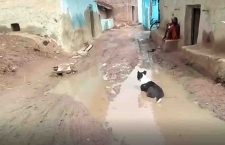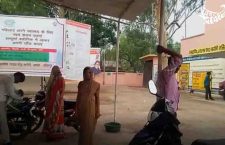In an ongoing series on rural finance, in partnership with Firstpost, Khabar Lahariya deep dives into its various facets, exploring the nature and details of daily transactional activities in Bundelkhand.
Part Six, the final edition of this series, takes a deep, hard look at the bank accounts in rural U.P. wherein actual transactions are meant to reflect.
Of all the strange things that happen in the heart of Uttar Pradesh, the meandering journey of direct cash transfers into beneficiaries’ bank accounts is one that’s deeply shrouded in mystery. With multiple delays and detours and eventual no-shows, this ultimately pushes rural citizens into greater debt and poverty traps.
Here are some voices from intended beneficiaries of some of this public money, highlighting the glaring gaps not only in the transparency of the transaction, but indicative of the larger systemic failure. These are across programmes that were specifically devised and structured such that the funds are deposited into bank accounts.
- MNREGA
Corruption in the implementation of this rural employment guarantee scheme, one of the most progressive schemes for alleviating increasing rural poverty and migration, is the great tragedy of our decade. The discrepancy between allocations and demand for work, and pending payments all aside – the way NREGA works, or doesn’t, is a decent representation of all that can go wrong with the most transparent of money flows.
Let’s travel to Mugaura village, Banda district for a moment. Workers here had not received their wages for four months after completing their work, and the proof of days worked – the job cards – were all held by the pradhan or the panchayat mitra, also responsible for getting wages released. The ‘documentation’ of hours and days worked and wages due were constructed on the whim of these officials. As Ram Naresh and Phulchand fumed, the wages released had little bearing on who had worked how many days. Rather, they were released into accounts where the officials were guaranteed a commission. And if you didn’t pay the commission, then you weren’t likely to get your next due wages.
https://www.youtube.com/watch?v=t1qtSfZhYyc
- Pradhan Mantri Aawaas Yojna
Housing for the rural and urban poor has been taken up by many governments in the past and continues to be a pet scheme of the current government too. As per this scheme, eligible (BPL) beneficiaries are sanctioned Rs 70,000 to build pukka houses. The money is released in two installments of Rs 35,000 directly into beneficiary bank accounts. The second installment is released on the uploading of photos of the state of construction and a cumbersome set of documentation. Residents of Virsinghpur, Ambedkarnagar district, like in countless other villages we reported in, erected walls with their first installment, and have been waiting for up to 3 years to build their roof. But the money hasn’t come. Often loans are taken to build, in anticipation of administrative delays. Bribes are solicited to release money that has already been released for a beneficiary. Rains come and go; belongings are kept in neighbors homes; weddings are fixed and canceled. Listen to Awadhraji, for instance, whose money is caught up in the confusion of different spellings on different identification.
It’s true, you know – it does all come back to the dratted Aadhar.
https://www.youtube.com/watch?v=1l8IOtWYfis
III. Farmer Loans Waiver
In 2017-18, after coming to power in the state, the BJP government allocated 36,000 crores towards waiving loans upto the value of a lakh for small and marginal farmers. Consider Mithailal, a farmer, in his seventies, steeped in poverty, from Karaunch village of Banda district. He has a bank account operated by a middleman, like most of his non-literate family and neighbours. His debt has been repaid and renewed, unbeknownst to him. All he knows is that he is not getting the loan waiver he voted the ‘Modi sarkar’ in for. Instead, he has a fresh loan in his name of Rs. 87,931.
https://www.youtube.com/watch?v=ocJiWmvzvs8
– Disha Mullick
This article first appeared on Firstpost. Read Parts One, Two, Three, Four & Five, of this special series.

